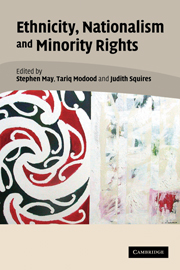Book contents
- Frontmatter
- Contents
- Preface
- List of contributors
- 1 Ethnicity, nationalism, and minority rights: charting the disciplinary debates
- Part I Ethnicity and ethnic groups
- Part II The state and minority claims
- Part III New directions
- 9 Redistribution or recognition? A misguided debate
- 10 Borders, boundaries, and the politics of belonging
- 11 Is it time to be postnational?
- Index
- References
10 - Borders, boundaries, and the politics of belonging
Published online by Cambridge University Press: 22 September 2009
- Frontmatter
- Contents
- Preface
- List of contributors
- 1 Ethnicity, nationalism, and minority rights: charting the disciplinary debates
- Part I Ethnicity and ethnic groups
- Part II The state and minority claims
- Part III New directions
- 9 Redistribution or recognition? A misguided debate
- 10 Borders, boundaries, and the politics of belonging
- 11 Is it time to be postnational?
- Index
- References
Summary
The title of the recent White Paper prepared by the immigration team of David Blunkett, the current Home Secretary of the British Labor government, is “Secure Border, Safe Haven” (January 2002). In the introduction to the White Paper, Blunkett explains the logic of the title. He sees “a clear, workable” and especially “robust nationality and asylum system” (pointing out that people crossing the Channel Tunnel in container lorries demonstrate how difficult it is to reach the UK) as a precondition of “our need to be secure within our sense of belonging and identity” (Foreword to White Paper). Blunkett is not alone. John Crowley actually defines the arena of the politics of belonging as the “‘dirty work’ of boundary maintenance (1999: 30).”
What I want to do in this chapter is to discuss questions relating to the politics of belonging and the relationship between them and constructions of boundaries and borders. After discussing the issues involved on a general level, I shall relate them specifically to the debate taking place these days in Britain on the construction of the national collectivity and the relationship between this and the notion of “secure borders.”
Since he became UK Home Secretary, David Blunkett has been engaged in finding ways of establishing a “sense of belonging” to the British national collectivity as a precondition for gaining formal British citizenship.
- Type
- Chapter
- Information
- Ethnicity, Nationalism, and Minority Rights , pp. 214 - 230Publisher: Cambridge University PressPrint publication year: 2004
References
- 43
- Cited by



